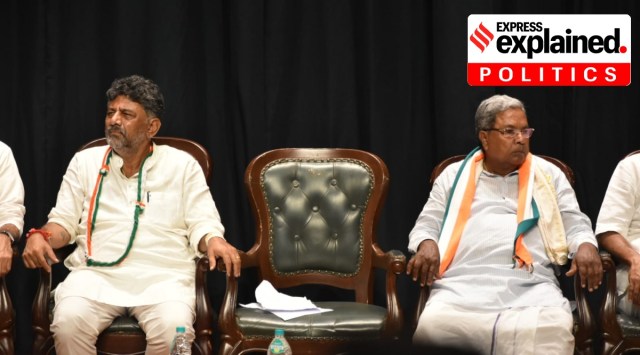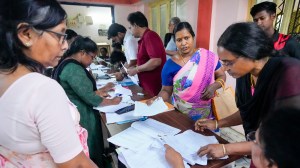Meet the two probable Karnataka Chief Ministers: Siddaramiah and DK Shivakumar
Congress party president Mallikarjun Kharge has hinted there may be a setup where each leader is at the helm for two-and-a-half years each.
 Congress leaders DK Shivakumar (left) and Siddaramaiah (right) during the press meet at KPCC Bengaluru on Saturday, May 13. (Express photos by Jithendra M.)
Congress leaders DK Shivakumar (left) and Siddaramaiah (right) during the press meet at KPCC Bengaluru on Saturday, May 13. (Express photos by Jithendra M.) The Congress party has emerged as the winner in the 2023 Karnataka Legislative Assembly elections, with results on Saturday (May 14) showing a decisive haul of 135 seats in the 224-seat Assembly, comfortably past the majority mark of 113.
Political analysts believe that one reason why India’s grand old party, which has not been in top form in recent elections, scored a win here was because of a deliberate focus on local leadership and issues. Rather than national figures such as Rahul Gandhi, two veteran state leaders were largely the faces of the campaign – former Karnataka Chief Minister Siddaramaiah and Karnataka Pradesh Congress Committee head DK Shivakumar.
This has also meant that a Chief Ministerial face was never projected by the party, and any news of infighting or rivalry was smoothened with the two leaders participating together during campaigning. Party president Mallikarjun Kharge has hinted there may be a setup where each leader is at the helm for two-and-a-half years each, out of the five-year term.
Here’s a brief look at how the two rose to power.
Who is Siddaramiah?
Former CM Siddaramiah was born in 1948 at Siddaramana Hundi, a remote village in Varuna Hobli of Mysuru District. Despite his humble origins, he graduated from Mysore University with a B. Sc. and went on to pursue a Bachelor of Law degree.
A follower of socialist leader Dr Ram Manohar Lohia, he made his entry into state politics in 1983, with his election from the Chamundeshwari Assembly Constituency in Mysore District on a ticket of the Bharatiya Lok Dal Party. This party was formed as an opposition to the Indira Gandhi-led Congress in 1974.
Siddaramiah went on to emerge as a Kuruba OBC leader, who attempted to consolidate the interests of backward castes, Muslims and Dalits.
Later, he joined the ruling Janata Party and after its split, the Janata Dal (Secular), headed by HD Dewe Gowda. Until he joined the Congress in 2006, after disagreements with Gowda, he was at various points appointed the state’s Minister of Finance and Deputy CM.
He was made the party’s state leader in Karnataka, led it to victory with 122 seats in the 2013 Legislative Assembly, and thus became the CM. While his party allied with the JD(S) in the next elections to keep the BJP at bay, BJP ultimately secured the support of Congress MLAs later on. Siddaramiah then became the Leader of Opposition in the State Assembly.
Despite being a mass leader with support spread across constituencies in Karnataka, the eight-term MLA has struggled in recent times to find a safe seat for himself, where rivalries between Kurubas and communities such as Vokkaligas, tribal Valmikis, and Dalits do not boost his prospects. He chose the safe seat of Varuna, having abdicated it in favour of his younger son Dr Yathindra Siddaramaiah in 2018. He ended up winning 60 per cent of the total vote share in 2023.
He also said earlier of contesting from Varuna, “Since this is going to be my last election, I am contesting it from here. I will retire from electoral politics, though I will remain in politics.” His son Dr Yathindra and his grandson Dhawan Rakesh, whose father and Siddaramiah’s elder son died in 2016, will be his successors, he said.
Who is DK Shivakumar?
The 60-year-old leader hails from the Vokkaliga community, largely concentrated in south Karnataka and making up around 15 per cent of the state’s population.
He has been a part of the Congress since his youth. During his years in college, he joined the National Students Union of India, the student wing of the party. Since then, he has risen through the ranks and been elected MLA seven times, contesting his first election from the Sathanur constituency when he was 27 years old. Shivakumar hit headlines in 2018 before the elections, after declaring assets worth Rs 618 crore.
During Siddaramaiah’s tenure as CM, he served as the Minister of Energy in the government. Also, he held the irrigation portfolio in the 2018 JD(S)-Congress government.
Shivakumar has not shied away from his ambitions for the post, lately. It is believed that though he was unsuccessful to prevent MLAs from moving to the BJP in 2019, he played a significant role in building the party back up for the latest elections.
He also faces corruption cases, including an ED chargesheet on money laundering charges over an amount of over Rs 8 crore, and a CBI probe over disproportionate assets. In 2017 Shivakumar and his associates were accused of income tax evasion to the tune of over Rs 300 crore, while Shivakumar himself was accused of evasion to the tune of Rs 34 crore.
In October 2020, the CBI filed an FIR against Shivakumar, based on the findings during IT searches in August 2017 on around 70 premises linked to him. The CBI alleged that Shivakumar had amassed Rs 74.93 crore of wealth disproportionate to known sources of income from April 2013 to April 2018, as energy minister in the Congress-led Karnataka government.
Shivakumar was arrested by the ED in September 2019 in connection with the money laundering case and was released on bail a month later. He became the KPCC chief in 2020. Yesterday, after early trends predicted a comfortable win for his party, he became emotional and said he could not forget party leader Sonia Gandhi coming to meet him in jail, “when all these BJP people put me in jail.”
As The Indian Express reported earlier on Shivakumar, “While his main rival for the post, former CM Siddaramaiah, is considered an astute politician in terms of caste politics and administration, it is largely the heads-down approach to electoral tactics and strategy which Shivakumar adopted – with the central leadership’s help – that delivered the results for the Congress.”
Both the leaders, as of Sunday evening, stressed that the party’s high command would decide the leadership.



- 01
- 02
- 03
- 04
- 05



































